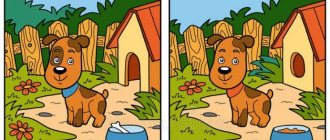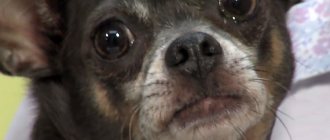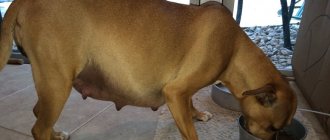Why does the dog grunt?
The main feature of the Chihuahua breed that is important to know about is its very short and pointed muzzle. Because of this structure, the dog has “reverse breathing” - an irritated palate provokes a spasm of the pharynx. This syndrome is also called “reverse sneezing.”
Many owners are seriously frightened by such manifestations of their pets - the animal can suddenly strongly stretch its neck, tense its chest muscles, and strongly arch its back. At the same time, the Chihuahua convulsively gasps for air, wheezes and makes loud grunting sounds, as if he is suffocating.
Don't be afraid when your pet grunts through his nose - this is how he tries to restrain himself in order to start breathing normally again. Some owners are touched by pets that make such funny sounds.
IMPORTANT! You have to be on your guard - there are times when Chihuahuas begin to choke. It’s better to prevent trouble - monitor your pet’s health so that he doesn’t get sick, overexcited or sad, because all these reasons can provoke strong grunting.
Why do Chihuahuas grunt?
Each is unique and has its own characteristics. But this doesn't only apply to people. Each dog breed also has its own obvious differences that make it stand out in one way or another. So, for example, the Besenji breed of African dog cannot bark. In addition, they are very similar to cats in terms of behavior. It is known that Bessenji the dog loves to wash himself with his paw. But, if this fact is quite common and many people love this dog precisely for its behavior and lack of barking, then what should you do when your little pet begins to grunt? We are talking about Chihuahuas - dogs that sometimes begin to wheeze very strangely, which worries more than one owner. And in this article we will try to tell why the Chuhuahua grunts.
Main reasons
When dogs grunt, they try to clear their airways. There are many reasons why this can happen - the reins are too tight, strong odors, powder getting into the nose.
It happens that a pet sneezes when it is very happy or eats food faster than usual. Another reason is problems with the sky. Your pet may have a cleft or a soft or drooping palate.
There are also more serious reasons - for example, serious health problems. It could be a tick, various infections, polyps in the mouth. Therefore, if your pet grunts with enviable regularity, then you should definitely show it to the veterinarian. Without timely assistance, the dog may get worse.
A heart attack is the most dangerous cause of grunting. The first thing that is important to pay attention to is the language. If he turns blue, the dog should be taken to the vet immediately.
Another problem that can cause a baby to “grunt” is obesity, so you need to monitor your Chihuahua’s diet and prevent the dog from overeating.
This problem is discussed in many veterinary forums. Doctors recommend carefully monitoring your pet’s condition, because dogs cannot talk about what’s bothering them. Therefore, all hope lies in the owner, who will sound the alarm in time, will not let the situation take its course, and will show the Chihuahua to a specialist.
Read what foods you can feed your Chihuahua.
It is not always possible to independently diagnose the cause of grunting, so it is better to entrust the examination to a professional.
NOTE! As veterinarians note, a dog that frequently grunts may have an inflammatory process, severe allergies, or collapse of the trachea.
Probable Causes
Cough is not a disease, but a symptom of some disorder in which airway patency is reduced. It appears for various reasons and is characteristic of a number of pathologies.
Therefore, if a Spitz coughs as if it was choking, you need to find out what was the impetus for the development of this alarming symptom.
Allergy
In this case, the cough is seasonal. Most often it bothers the dog in the spring and summer.
The cause of this cough lies in contact with strong allergens such as flowering plants, food, dust and chemicals that provide protection against fleas and ticks.
Usually it is non-stop and is accompanied by a number of easily recognizable signs. Allergic cough is accompanied by:
- sneezing;
- tearfulness;
- blueness of mucous membranes;
- redness of the eyes;
- itching and rashes on the skin.
Parasites
If a pug or chihuahua is coughing, then it cannot be ruled out that the dog is infected with helminths. Most often, this symptom indicates infection with toxocara or hookworm.
Dogs that are kept in unsanitary conditions are susceptible to infection. Infection occurs through accidental ingestion of a larva or adult parasite.
Through the bloodstream, helminths are transferred to the lungs, and when there are too many of them, the dog begins to develop tracheobronchitis or an inflammatory process. Parasitic cough worsens when lying down and is accompanied by:
- sudden weight loss;
- increased fatigue;
- difficulty swallowing;
- deterioration in appearance.
Important! A dog that is infected with heart parasites may have seizures and develop photophobia.
Foreign body or damage
The cause of a cough may be hasty swallowing of food. A foreign object in the respiratory tract provokes irritation of the mucous membrane.
As a result, the dog develops a choking cough, which is accompanied by:
- wheezing;
- foamy nasal discharge;
- sneezing;
- drooling mixed with blood;
- labored breathing;
- regurgitation;
- refusal to drink and eat.
A similar cough may be caused by a collar that is too tight, a tumor, or fluid buildup in the airways.
Viral diseases
Another reason that a Pug or Yorkshire Terrier coughs is kennel cough, or viral laryngotracheitis. This is an infection of the pulmonary system that is transmitted by airborne droplets.
In addition to a dry, hacking cough, it is characterized by the following symptoms:
- lethargy;
- enlarged tonsils;
- swelling of the throat;
- refusal of food;
- snorting sounds;
- nausea and vomiting;
- sneezing.
The first symptoms appear 2-14 days after infection. At risk are puppies and older dogs that are in close contact with other animals.
Important! Kennel cough requires timely treatment. Otherwise, it is fraught with the development of pneumonia.
Other animal diseases
If your Yorkie is coughing as if he's choking, but doesn't have parasites, allergies, or a virus, he should be checked for other health problems.
This symptom may indicate the following pathologies:
- Weakness of the heart muscle, which puts pressure on and interferes with the normal functioning of the respiratory system. In this case, the dog experiences not only expectoration, but also shortness of breath. Visually, it seems that the dog does not have enough oxygen and is suffocating.
- The presence of a cancerous tumor on the heart muscle or bronchi. In this case, the animal experiences lethargy, increased temperature and decreased appetite. The cough itself is constant. It is very deep, with phlegm or blood.
- Tracheal collapse. Miniature breed dogs are susceptible to this disease. It occurs as a result of damage or deformation of the trachea. It can be recognized by dry breathing, attacks of suffocation, wheezing and shortness of breath.
What to do?
One simple but proven method will probably help. The dog needs to be placed on the floor or table, the main thing is that the surface should be flat. Gently massage your back in a clockwise direction. It is important to lightly support the Chihuahua under the tummy. You can lightly run your hand over your pet's throat to help him swallow.
Another option is to close your nostrils with your fingers. The dog will inhale air through its mouth and swallow saliva, as it will not be able to breathe through its nose.
Has your pet started to choke? First, check to see if your pet is choking—there may be something sticking out of her mouth. Then the foreign object must be carefully removed.
There is another way. Rub the bridge of your pet's nose, press on the wings of the nose, and then press on the root of the tongue. The dog may resist and start barking - this will also help open the way for oxygen.
Chihuahua owners recommend giving dogs antihistamines if they grunt frequently - this reduces the intensity of attacks. However, it is better not to self-medicate, but to consult a veterinarian. The specialist will tell you which product is best for your pet and recommend the correct dose.
Why does a Chihuahua grunt and is it dangerous?
Many dwarf dogs are characterized by periodic grunting, which is caused by the peculiarities of their structure. In this case, the short muzzle plays a role, due to which the so-called “reverse sneezing” occurs - this means that the irritated palate provokes a spasm of the pharynx.
When a dog grunts, it is trying to clear its airways. This can happen for a number of reasons, for example, due to a tight leash, strong odors, or various powders getting into the nose. It is not uncommon for a Chihuahua to sneeze like this when he is happy or eats too quickly. This is often caused by problems with the palate (cleft, too soft or droopy).
This occasionally happens to almost all representatives of the breed, but if a Chihuahua coughs frequently, the reasons may be more serious: tick damage, various infections, the presence of polyps in the nose or mouth, etc. Therefore, in case of regular attacks in a puppy or adult dog, you need to contact see a specialist - if the problem progresses, attacks of real suffocation may appear.
One of the most dangerous causes of grunting is a heart attack. The blue tongue points to him. In this case, the animal must be urgently taken to a veterinary clinic. Heart problems can be detected in advance if the dog sniffles. This is often associated with obesity.
A “session” of ordinary grunting usually lasts no more than 30 seconds. At the same time, the dog freezes with his head down and begins to cough distinctly (similar to the sounds that a cat makes when it tries to cough up fur). If after this the animal behaves as usual, there is really nothing to worry about. Sometimes you can speed up the process by simply clapping your hands.
But if the dog continues to grunt for more than half a minute, place it on a flat surface and massage its back clockwise while gently supporting it under its belly. You can also lightly run your palm over the throat, from the throat to the chest - this will help the pet swallow. You can close the nostrils with your fingers: if the dog cannot breathe through his nose, he will reflexively inhale through his mouth and again swallow saliva.
But if the Chihuahua is choking, you need to immediately clear the airways. First, make sure that the dog is not choking - look to see if anything is sticking out of its mouth. If so, try to remove it. Otherwise, you should rub the bridge of the nose and press on the wings of the nose, as if forcing the dog to “blow its nose.” Then open the dog’s mouth and press on the root of the tongue: reflex expectoration will open the way for oxygen. If the pet begins to resist and bark, this will also open up breathing. Such an attack can be triggered by too much stress or allergies. If this happens for the first time, you need to show your pet to a specialist.
Some owners, in order to reduce the frequency and intensity of grunting attacks in their pets, give them antihistamines. Judging by the reviews, this really helps, but you can resort to this method only after consulting a veterinarian: it is difficult for an amateur to calculate the correct dose, which is why the result can cause more harm than help.
By the way, if your dog snores, there is no reason to worry - this is also a feature of the breed. But if you hear a whistle, you should contact your veterinarian.
Thus, an immediate visit to a specialist is necessary only if attacks of grunting occur constantly or last longer than normal, and also when the dog begins to outright choke. In other cases, they can be considered acceptable, although there is nothing good about it.
Why does my pet snore?
Chihuahuas not only grunt, but also snore and sometimes do it so loudly that they do not allow their owners to fall asleep.
Snoring itself does not affect the animal’s life in any way, but it can be a signal to the owner that the pet may have a serious illness. Owners of dogs of some breeds may be seriously alarmed. But in a number of pets, snoring is associated with physiology, just like grunting - its cause is a shortened muzzle.
Is there any point in worrying if a Chihuahua snores not from time to time, but regularly? If your pet snores only at night while sleeping, then you should not be upset, but if strange sounds begin to appear suddenly during the day and do not go away for a long time, then this is a reason to sound the alarm.
There can be many reasons for snoring. One of the most popular is improper dog nutrition. Your pet will likely need a special diet.
It is worth taking measurements of the humidity at home to understand whether such conditions are suitable for the dog - perhaps its mucous membranes dry out during sleep.
IMPORTANT! If a pet snores heavily, owners of dogs of this breed recommend taking their Chihauhua to a veterinarian so that he can understand the reasons and rule out serious diseases.
Eye diseases
The Chihuahua has slightly protruding eyes that are larger than those of many dogs. Due to this unusual shape of the eyeballs, symptoms of many eye diseases can often be found in dogs of this breed:
- keratoconjunctivitis is a disease that causes dry eyes;
- glaucoma is a disease that develops due to increased pressure inside the eyeball;
- cataract is clouding of the lens.
If your dog's eyes are watery or running, redness is visible, he constantly blinks and rubs his eyes, and his eyes become too dull in color, then he is showing signs of eye disease.
What to do: urgently contact a veterinarian-ophthalmologist. He will conduct the necessary diagnostics and prescribe treatment. The main thing is to be on time, otherwise serious consequences may arise, from the need for surgical intervention to complete blindness.
We invite you to read: How long do chickens and roosters live at home, life expectancy of laying hens and broilers
Chihuahuas sometimes lose their eyes. This pathology can occur if the pet's head has been subjected to mechanical damage. Representatives of this breed have a shortened skull structure, and the eyeballs last only for centuries, so eye loss is a common occurrence.
The most striking symptom of this problem is protrusion of the eye. If the eyes are watering, bleeding, and the dog is afraid of light, then before going to the hospital you need to take some measures.
First, you need to keep the dog calm and try to keep his paws away from his eyes. A special collar or suitable clothing is perfect for this purpose.
Second, gently wipe the affected eye with saline solution. No antiseptics: no alcohol, no hydrogen peroxide. After this, lubricate the eye with a large amount of suitable ointment - tetracycline or floxal.
Third, apply something cold for fifteen minutes to relieve swelling. Then cover the damaged area with a wet cloth.
Types of wheezing
Depending on the problems, the dog grunts and grunts in different ways:
- dry wheezing usually indicates that the animal is having difficulty breathing. There is a narrowing of the trachea or lumen in the bronchi. This usually happens with bronchitis, or when the dog has swallowed a foreign body. In this case, the exhalation becomes much louder than the inhalation;
- Moist rales are heard when there is a lot of fluid in the lungs. Then the dog can make gurgling sounds through its nose and grunt. Such wheezing is easily distinguishable, even if you do not come close to the animal. The air movement due to the liquid becomes slow, and a characteristic sound appears. This can happen with bronchitis, pneumonia, pulmonary edema;
The dog makes different sounds
- grunting, accompanied by a whistle, appears when the airway becomes too narrow. This can occur, for example, when a foreign object enters the trachea or when the vocal cords are damaged;
- Grunting with shortness of breath, in which the pet appears to be suffocating, can be observed during a heart attack. Then the pet urgently needs medical attention.
Important! It is not always possible to immediately understand why a dog began to grunt. To make sure that this is not a symptom of a dangerous disease, you need to contact your veterinarian. He examines the pet to see if there is a foreign body in its nasopharynx, listens to breathing and, after listening to the owner’s story, makes a diagnosis.
What to do if your dog's cough doesn't go away?
Representatives of small breeds such as Yorkies, Pugs, Chihuahuas and Spitz are often susceptible to congenital defects of the respiratory system. One of the causes of cough in small dogs is tracheal collapse. At an early stage, the pathology can be cured by taking medications that improve the condition of cartilage tissue.
If drug therapy is unsuccessful, the dog will have to be operated on. During surgery, the animal will have its deformed tracheal rings replaced with artificial ones.
If the cause of your Pug or Pomeranian's cough is not a collapsed trachea, then you should consult your veterinarian again. Perhaps the dog was prescribed the wrong dosage of medications or the owner gave the medications according to the wrong schedule.
Natural predisposition of some breeds
There are dog breeds that grunt due to their structure. These dogs have a short, or as it is often called, flattened muzzle. Among them are a pug, a Pomeranian, a chihuahua, a sharpei, a bulldog, a mastiff, a Pekingese, and a Yorkie.
Their nasal cavity is small, and the air entering through the nostrils does not have time to cool, so the dog sniffles and makes grunting sounds. The structure of the nasopharynx leads to the fact that hot air immediately goes into the lungs, which provokes heat strokes. Such animals need to be monitored and periodically shown to veterinarians.
Note! Doctors say that nothing needs to be done if a dog with a short muzzle snores and grunts. Usually people quickly get used to such sounds. But this does not negate the need to periodically show the animal to specialists to rule out health problems.
Difficulties may arise in hot weather. Pets with short muzzles do not tolerate stuffiness and the scorching sun. They may even choke on their own drool and begin to choke. Therefore, you need to be especially attentive to them when walking during the summer afternoon sun and on long trips.
Physiology of the breed
The Chihuahua is generally a unique creature. This is the smallest dog in the world (officially recognized). Also, this is one of the most ancient representatives of the entire canine genus.
Among the most important features of the breed it is worth noting:
- Presence of fontanel. It is also called molière. This is a soft spot on the crown of the skull that can be noticed when your pet is young. However, even in some adult individuals this fontanel does not close with age. The owners consider the Moliere to be a peculiarity of the breed. But experts are more skeptical. In professional circles, a soft spot is considered a defect, especially if the dog has reached puberty.
- Short muzzle. This feature, perhaps, answers the question why the Chihuahua grunts as if it was choking. Indeed, because of this structure, it is sometimes difficult for the dog to breathe, and with the help of grunting (more professionally, reverse sneezing), the pet tries to restore normal breathing.
Therefore, first of all, there is no need to panic, because grunting is a process inherent in a pet by nature. Naturally, it is better that the dog does not have such incidents, but if it does happen, then you should treat its reverse sneezing with understanding.
Mechanical damage and foreign bodies
Outside, while exploring the surrounding area, the dog may inhale something, such as a piece of paper or a small stone. An unknown object can damage the mucous membrane, which will cause, at a minimum, discomfort for the dog.
The following symptoms are possible:
- the animal begins to breathe through its mouth and keeps it constantly open;
- the dog begins to cough in fits and starts, as if he is trying to burp something;
- the dog constantly sniffs and touches it with its paws;
- blood appears in saliva.
The animal may also refuse food and food. Foam sometimes comes out of the nose.
If grunting sounds appeared precisely after a walk, then a foreign body is the first thing to think about when looking for the cause of the ailment.
Important! You should not try to remove the object yourself; you can push it deeper, which will cause breathing problems or may scratch the mucous membrane. It is better to trust the professionals and take the animal to the veterinary clinic.
Dog at the vet
Main causes of difficulty breathing
A dog grunts for several reasons. Sometimes this does not cause problems and does not affect the pet’s quality of life. Often, a similar symptom appears during allergic reactions. At the same time, the animal’s eyes water, they may turn red, the dog sneezes and grunts. This is how he may react to the bites of certain insects or to changes in diet. In some cases, breathing difficulties are a symptom of dangerous diseases.
Reverse sneezing
Reverse sneezing usually occurs in dogs with a shortened muzzle. This is one of the characteristics of breeds that is associated with spasms of the tissues of the soft palate.
Note! Veterinarians say that there is no need to panic in such cases, especially if the attack lasts only a few seconds, and after that the dog returns to normal life.
To help the animal come to its senses, you need to remember simple rules that will relieve the attack:
- you need to gently rub your nose;
- Slowly and gently massage the surface of the throat.
After the attack is over, you need to give your pet warm water.
The dog drinks water
When the trachea collapses, it undergoes a sharp and severe narrowing. It may be that there is practically no gap left, and the animal will begin to suffocate. Before this, it will wheeze, grunt and make sounds reminiscent of quacking. Do not hesitate to contact a doctor; your dog may need to be intubated by inserting a tube into the trachea. Sometimes this is the only way to improve breathing and save your pet’s life. Only specialists can provide emergency assistance.
Important! In any case, if the animal breathes only through its mouth and wheezes, and its mucous membranes have turned blue, there is no need to hesitate. The dog may fall into a coma, and even if he is saved, this episode will affect his health in the future.
Paroxysmal breathing
Paroxysmal, or reverse, breathing is observed exclusively in male dogs. An attack when a dog wheezes, grunts and seems to be suffocating, frightens the owners, because strange sounds are not the only thing that changes in the animal’s behavior:
- the dog spreads its paws wide and at the same time strongly arches its back;
- his muzzle takes on a terrifying expression, his eyes turn red;
- he begins to vigorously shake his head from side to side, so that drool flies everywhere.
This condition is dangerous because the dog inhales the air forcefully, it irritates the palate and this can provoke vomiting. At this time, the animal grunts, drawing the contents of the oral cavity back. This can cause vomit to enter the lungs, leading to pneumonia.
Parasite infestation
Worms live not only in the intestines; some species prefer to settle in the lungs. They cling to the walls, injuring the mucous membrane, destroying the bronchi. After the parasites begin their activity, they secrete substances that damage tissue. As a result, the animal begins to cough. This further irritates the organ mucosa, and the condition worsens. The dog is breathing with difficulty, gurgling and grunting can be heard.
Note! If you do not get rid of parasites, they can lead to poisoning of the body. If left untreated, your pet may suffocate.
Heart problems
A dog that grunts may be suffering from heart failure. This is usually typical for older animals. They are constantly thirsty and walk around with their tongue hanging out, which looks quite pale. The animal's gait changes; it reflexively spreads its paws wide. Often the dog is tormented by a cough, the attacks of which are quite long.
The dog is coughing
During a heart attack, your dog doesn't just breathe heavily, he begins to wheeze. In this condition, she must be quickly taken to the clinic.
Pulmonary edema
Pulmonary edema can be caused by infectious diseases, as well as heart failure. At the same time, the dog makes sounds that are unusual for it, wheezes, and has shortness of breath. The tongue and gums become noticeably pale, and the animal is bothered by a dry cough.
Important! Until the dog receives help from specialists, you need to monitor his breathing and remove drool so that he does not choke.
Tumors
When a tumor occurs in the nose, the following symptoms appear:
- grunting develops into a cough, which develops gradually, intensifies and does not go away;
- the animal becomes lethargic, inactive, loses its appetite, and loses weight;
- I'm worried about a runny nose, traces of blood are found in the discharge.
The presence of such signs requires contacting an animal medical clinic.
Why in Chihuahuas? (What to do, if. )
Why does a Chihuahua vomit?
Vomiting is a very alarming symptom. It occurs in many serious diseases. And if the dog does not eat and vomits quite often, then this is a serious illness.
Your actions: The dog needs to be shown to a doctor urgently.
Why do Chihuahuas have watery eyes?
A dog’s eyes can become watery for several reasons: due to severe anxiety, an eye infection, an allergy to external factors or to food, or obstruction of the tear ducts. What to do: 1. Wash your dog's eyes with contact lens solution. 2. Remove anxiety factors. 3. Take your dog to the doctor.
Why do Chihuahuas grunt?
1. The Chihuahua has a shortened muzzle, that is, thin and narrow passages in the nasopharynx. 2. Strong excitement, which causes spasm of the muscles of the nasopharynx. 3. Nasal congestion, swelling of the nasal mucosa. 4. Deviation of the nasal septum.
Your actions: 1. Avoid strong excitement and overheating. 2. Avoid colds and infections. 3. Visit a doctor and check the correct development of the nose and pharynx.
Why do Chihuahuas' ears itch?
A dog may scratch its ears for the following reasons: 1. The Chihuahua has accumulated wax in the ear canal, and it causes irritation. 2. A foreign object or insect has entered the ear. 3. Otitis media (ear inflammation) begins. 4. The dog is allergic (to food components, environmental components and toxins produced in blocked paraanal sinuses).
Your actions: 1. Check the anal sinuses. If necessary, empty them. And treat it. 2. Soften the wax plug with ear lotion. 3. Switch the dog to one type of food for 2 weeks, remove new chemical components from the dog’s environment or new flowers. 4. Show the dog to the doctor.
Why do Chihuahuas shake?
In Chihuahuas this happens in several cases. 1. From excitement or fear. 2. From pain. 3. If the dog is cold. 4. If the dog is vomiting.
Your actions: 1. Create warmth for the dog. 2. Remove stressors (for example, strangers, children running around, large dogs). 3. Check your dog's stress level. 4. Show the dog to the doctor.
Why does a Chihuahua itch?
Dogs itch for a variety of reasons. These are the reasons. 1. Dogs have insects. And not just fleas. These could be microscopic mites, lice or lice. If there are insects on the dog, the itching is very severe. The dog itches incessantly, even at night. 2. Allergic flea dermatitis. Sometimes fleas attack domestic dogs on the street and in the entrance and cause an allergic skin disease, which is accompanied by severe itching. 3. Allergies to food and environmental components. 4. Overflow of the paraanal sinuses. Usually in this case the dog begins to bite the back of the body (hind legs, back, tail, croup). 5. Itching is caused by bacteria and yeast. 6. Don’t forget about contact dermatitis. When some household item causes your dog to itch. For example, a beautiful new sweater that you bought for your dog. 7. Lack of vitamin A and some microelements. 8. Excess of B vitamins. 9. Diseases of the intestines, liver and kidneys cause itching in dogs. 10. Extreme anxiety and stress.
Your actions: 1. Preventively treat the dog against insects. 2. Start feeding hypoallergenic food and feed it for 4 weeks. Without adding anything else to the diet. 3. Remove new things from the dog that it comes into contact with (bedding, houses, clothes, collar, etc.) 4. Show the dog to a doctor.
Why do Chihuahuas tremble?
Dogs of this breed most often tremble from: 1. Fear (loud noises, unfamiliar people or dogs, unfamiliar places) 2. Pain (diseases of the joints, liver, kidneys, pancreas, brain cause severe pain). 3 Unrest. If the dog is facing unfamiliar movements, procedures, and so on.
Your actions: 1. Observe the dog when the trembling begins most often, under what circumstances. 2. Avoid these circumstances. 3. Complete a program with a zoopsychologist to help your dog adapt to unusual events. 4. Show your dog during puppyhood more people and dogs that are unfamiliar to him in a state that is not dangerous for the puppy. For example, you hold her in your arms and show her a new person, a child, a car, a non-aggressive dog. 5. You can use sedatives, such as Kotbayun. 6. See a doctor for research (you need to donate blood, urine, feces, and do an ECG).
When to contact a veterinarian
A veterinarian's consultation is always necessary if the dog seems to be choking and grunting. Perhaps the cause will be harmless and treatment will not be needed, but it is better to play it safe to avoid complications.
You need to consult a doctor in the following cases:
- the dog’s condition worsens, it becomes lethargic, refuses to eat, and loses weight;
- the dog has an intensified cough that he cannot cope with;
- the animal’s mucous membrane takes on a plum tint, its breathing is difficult, and shortness of breath is noticeable;
- The pet developed snot and a fever.
Only a veterinarian will tell you what to do if the dog snores, grunts and gasps, so as not to harm it. If you have doubts and unfamiliar sounds appear more and more often, do not postpone your visit to the clinic.
If your dog starts to grunt, you should never panic. When this happens once, and the dog’s well-being and mood do not change, there is no reason to worry. If the pet is choking, then he needs the help of a veterinarian. Before it is provided, it is necessary to monitor the pet, easing its condition, and controlling its breathing.
In terms of devotion to its owner, no pet can compare with a dog. When caring for your pet, a person becomes so attached to it that in the event of health problems, he worries no less than for his loved one. Many owners are concerned about the question: why does their baby Chihuahua grunt.
Symptoms that appear in a completely healthy pet are especially alarming. In this article we will touch on the problem of why Chihuahuas grunt, and we will try to find out what causes this phenomenon and whether it is dangerous for the dog’s life.
What to do when your Chihuahua grunts?
The Chihuahua is the healthiest dog breed, and with proper care, it will not cause much trouble. The only thing its owner needs to know is the physiological processes characteristic of this breed.
Become familiar with potential threats in detail and be able to prevent them. Animal behavior when grunting occurs:
- the dog suddenly freezes in one position
- arches his back like a house and bends his head down
- she begins to cough, from the outside it looks as if the chihuahua was choking on a bone, the sounds emitted in the process are quite loud and pronounced
- When the attack subsides, breathing returns to normal
If, after the end of the grunting, the Chihuahua does not exhibit any strange behavior, it means that breathing during the cough was not impaired, and she is not in danger.
Experienced dog breeders say that when a Chihuahua grunts, it looks more terrifying than it actually is.
To avoid unnecessary anxiety that unnerves you and your pet, the first thing you need to remember is that grunting usually lasts no more than 30 seconds.
The second point is that during grunting, breathing is not disturbed, the mucous membranes have a natural color, and muscle tone remains normal.
Your pet only needs help if the cough does not stop after 30 seconds.
What should be done:
- Place the Chihuahua on any hard surface so that it rests on all its paws and can arch its back.
- Use one hand to gently hold the Chihuahua's belly.
- With your other hand, gently massage your pet's neck, using circular movements from right to left.
- If your actions do not bring the desired results, and the dog continues to make grunting sounds, move your palm from the larynx to the chest, or make the animal stop breathing through its nose. This will help her reflexively swallow saliva and breathe in through her mouth.
Before you begin to help your pet, it is necessary to accurately determine the cause of a prolonged cough.
Initially, make sure that there is no foreign object in the mouth. If you find it, immediately pull it out yourself; it is not difficult to do this by unlocking the jaw and removing the object stuck in your mouth.
If the cause of the grunting is a heart attack, the animal's tongue will turn blue. If these symptoms appear, you should take the animal to a veterinary clinic. At night, loud snoring without whistling is a natural phenomenon and there is no reason to worry.
When does a Chihuahua have a coughing or wheezing attack?
This symptom almost never occurs when the dog is at rest. Spasmodic breathing occurs during:
- emotional overexcitation of the animal;
- walking on a leash if the dog breaks from it;
- in a state of high physical activity;
- extreme heat;
- stress;
- inhalation of strong odors.
Chihuahua owners should remember that the breed is not suitable for hunting or too active games. It is important to avoid situations that are stressful for the animal. When walking, it is better to wear a harness instead of a collar. In the hot season, walk for a short time, mostly in the shade.
Prevention of Chihuahua diseases
It is better to prevent any disease than to treat it. Therefore, all owners of small dogs should know the basic rules of prevention.
- Do not allow your pet to become hypothermic. During the cold season, wear waterproof dog clothing and shoes when walking. The breed is vulnerable to hypothermia and dampness.
- Protect your pet as if it were a small child. Do not allow dogs to jump from heights, fall, or go down stairs. Block entrance and interior doors and keep them closed. This will help avoid injury.
- Normalize your pet's physical activity and maintain a daily routine.
- Select high-quality food, carefully follow the recommended diet and feeding standards.
- Take good care of your pet's teeth and mouth.
- Never leave your pet alone with small children - it is unsafe.
- Follow the schedule of vaccinations and preventive examinations.
- Make sure that the puppies receive the required amount of mother's milk; they should never go hungry - this is the prevention of hypoglycemia.
Follow these rules carefully, be loving and caring owners, and devote enough time to your pet. This is the key to a long, comfortable and happy life for your dog.
Why does a dog wheeze, grunt, or cough when breathing?
The unusual phenomenon is sometimes called reverse sneezing or coughing. The animal's breathing is difficult, the dog wheezes. The neck is stretched forward, the front paws are widely spaced. Excessive salivation may occur. In such a stance, the Chihuahua coughs as if she was choking.
Owners who observe such an attack for the first time are frightened. However, there is no reason to panic; this is a physiological feature of the breed. Dogs with a small head and a short muzzle, called brachycephals, have a special structure of the larynx. She has a soft, elongated palate, the muscles of which reflexively become toned at the slightest stress. Saliva from the oral cavity enters the larynx, provoking the collapse of the trachea - its reflex closure. The soft palate sags and touches the epiglottis, narrowing the lumen of the trachea.
The dog tries to take a full breath, but a sharp intake of air causes new stress and the process goes in a circle. This is why your Chihuahua wheezes and grunts when breathing or coughs as if there is a foreign body in its throat.
Unexplained cough
If your pet is coughing, there may be several reasons. The unusually short structure of the head of Chihuahua dogs does not allow them to breathe deeply, especially during a sharp transition from a calm state to an excited one.
This is a common occurrence for such dogs; there is no need to worry at such moments. Distract the baby, calm him down - gently pick him up and stroke him. If it doesn’t help, close its spout with your hand for a few seconds to equalize the air pressure.
But if coughing attacks become more frequent, consult a doctor. Your dog may be having an allergic reaction to an external irritant or contracting a viral infection.
We suggest you read: Barbs compatibility with other fish: Compatibility of barbs in an aquarium, photos, videos
What help can the owner provide during an attack?
No special treatment or medications are needed if we are talking about the breathing characteristics of the Chihuahua, and not about systemic diseases.
What the owner should never do is panic and further irritate the dog. If the causes of wheezing lie in the characteristics of the breed, and it is not allergies, asthma or poisoning, then the following may help:
- Take the dog in your arms and stroke it soothingly. Sometimes this simple action helps calm a reversible cough.
- Apply light pressure to the dog's nostrils, forcing him to breathe through his mouth. Gently stroke the animal along the neck, from the chin to the chest. Stroking will relieve spasm.
- Vigorously rub the chihuahua's nose at the bridge of the nose. This movement will open the narrow nasal passages characteristic of the breed for air access.
- Open the dog's mouth as wide as possible and press on the root of the tongue. The pet will make a grunting, expectorating sound and its throat will open as much as possible for breathing.
- Spread the dog's jaws, as when showing teeth, only much wider. The animal will not like this and will begin to struggle and squeak. However, squealing and barking clear the airways.
No matter what manipulation the owner performs, the main thing is to remain calm so as not to aggravate the dog’s condition. Any pet feels the owner’s anxiety and begins to worry, which can provoke a new wave of suffocation.
Typically, a Chihuahua will make these grunting sounds for a few seconds to two minutes. Sometimes the attack is so short that the dog owner doesn’t even have time to do anything, but the baby is already “fine.”
Giving help
As already described above, grunting is a habitual natural process of this breed. But it happens that the sneezing attack drags on, and in this case the dog needs help. Let's look at when it is needed and when it is not.
First of all, after the dog starts grunting, watch it. If he coughed loudly, lowered his head, and then calmly stopped, then you don’t have to worry.
If this happens regularly, don't panic either. The main thing is that the duration of the grunting does not drag on. Normally, it is 15-30 seconds. Usually this time is enough for the dog to return to normal breathing. If 30 seconds have passed and your pet still cannot clear his throat, then he needs help. If your pet's grunting continues for a long time, then rush to his aid.
In this case, you need to perform a number of the following operations:
- Initially, you need to firmly place the Chihuahua on the floor. He should rest his feet and arch his back slightly.
- Now you need to lightly grab your pet's stomach with one hand. The main thing is not to squeeze.
- With your free hand, begin massaging the neck and spine. It is done carefully, with circular massage movements. Circles are made clockwise.
- If this procedure does not help, and the pet does not feel better, then they perform “pushing” of the Chihuahua’s saliva. To perform it, you need to lightly move it from the throat to the dog’s chest. If everything is done correctly, the dog should swallow saliva and begin to breathe normally.
- Alternatively, if the above procedure does not help, you can close the dog’s nose with your fingers. This should provoke a reflexive inhalation through the mouth. When inhaling, the Chihuahua should reflexively swallow saliva.
When does hoarse breathing require veterinary help?
There are several alarming symptoms when wheezing when breathing is caused not only by the structural features of the larynx in a Chihuahua.
- The attacks are occurring more frequently and lasting longer than a couple of minutes. If breathing does not return to normal for a long time, the owner should think about why the Chihuahua grunts as if it is suffocating. Is this phenomenon caused by heart disease? Because such symptoms are also observed in animals with heart disease. Excess weight in Chihuahuas also leads to shortness of breath.
- Sneezing and coughing are accompanied by copious nasal discharge. Rhinitis can be infectious, allergic and acute. Each requires its own treatment. With any of them, mucous secretions prevent the dog from breathing, blocking the already narrow nostrils of the Chihuahua. It is rhinitis that can cause a dog to grunt and wheeze when breathing.
- Attacks of suffocation result in the pet losing consciousness. A very dangerous symptom with a wide range of causes: poisoning, heat stroke, injury, vasospasm, asthma, etc. Only a qualified veterinarian can figure out what causes fainting.
Structure and functional purpose of the trachea
Trachea ( second name
: windpipe) is an air-bearing, elastic and flexible hollow organ, a connecting link between the upper and lower respiratory tracts.
Divided into cervical and thoracic parts. At the level of the fifth rib, bifurcation (branching) into two main bronchi occurs. The tracheal framework consists of cartilaginous hyaline open
C-shaped rings covered with fibrous (fibrous) connective tissue that has high strength and elasticity.
Visually resembles a vacuum cleaner hose. The Chihuahua's trachea performs three important functions:
- respiratory;
- voice;
- filtering
In addition to providing the body with oxygen, it performs a filtering function. Dust and microorganisms settle on the ciliated epithelium of the inner mucous membrane of the windpipe and are removed from the body along with mucus by reflex coughing.
The tracheal rings with their open part are turned towards the back (spine), connected by smooth muscles and connective tissue. This formation is called the dorsal tracheal membrane. The esophagus is tightly adjacent to the trachea. One of the important tasks of the dorsal tracheal membrane is to organize the unimpeded movement of lumps of food along the esophagus by expanding the cartilaginous rings without compromising the functioning of the respiratory system.
Thus, the design ensures constant movement of air during breathing by maintaining the necessary lumen of the trachea. Pathological narrowing of the diameter of the tracheal lumen in a Chihuahua entails unpleasant consequences in the form of complications, including the death of the animal due to acute respiratory failure.
Dog snoring while sleeping
Almost all brachycephalics snore periodically during their sleep. However, if this has not been observed in your dog before, but suddenly begins to snore, you should seek medical help to rule out dangerous diseases. You should be wary if there are gurgling sounds in your sleep - the dog seems to be choking. Also an alarming symptom is snoring too loudly during inhalation and exhalation.
If night wheezing is accompanied by lethargy, pallor of the mucous membranes of the mouth, and poor appetite, it is probably a cold. It is important to monitor the animal and prevent swelling of the nasopharynx, which can develop into bronchitis or pneumonia if not properly treated.
If your pet constantly grunts and snores in his sleep, that’s cute. However, the owner must be vigilant and exclude hyperplasia (thickening) of the animal’s palate. This can be completely harmless, but there is a possibility that surgical intervention is required.
Special sounds when breathing make this breed even more endearing. However, if the owners notice that the Chihuahua is grunting and this is causing her discomfort, it is better to consult a doctor and make sure that everything is fine with the pet, then he will live a long and happy life.
It is also useful for you to know: At what age do Chihuahuas change their teeth?
Snoring in a dog as a symptom
In brachycephalic dogs, it is necessary to exclude thickening (hyperplasia) of the soft palate. Pathology can provoke suffocation in a dog during sleep, when the animal’s muscles relax. Most often, pets with flat or upturned nostrils suffer from the disease - Boxers, Japanese Chins, Pugs, Bulldogs. The veterinarian examines the dog and orders a laboratory blood gas test. Together with the medical history, the doctor decides what to do next, and there are only 2 options - observe and perhaps the dog will happily live a full life or operate. If your “flat-nosed friend” sniffles and grunts constantly, without delay, show the dog to a doctor who will determine whether this is normal; most often, the pathology is associated with weight gain and overload of the heart muscle.
If your dog suddenly starts snoring, you should conduct a general examination and monitor the pet. Most often, in parallel with breathing problems, other symptoms are observed - weakness, pallor of the mucous membranes, depression. The first thing to rule out is swelling of the nasal mucosa due to a cold. Typically, when a pet has a cold, there is sneezing, mucous discharge from the nose, redness of the eyes and tearfulness. Coughing during a cold is an aggravated situation when swelling moves from the nasopharynx to the throat, and then bronchitis and pneumonia develop.
Due to allergic swelling of the larynx, the dog wheezes and suffocates, which is an acute and dangerous condition. Your task is to relieve the swelling with the help of antihistamines and show the animal to the veterinarian. Please note that until you identify the source of the allergen, the dog will be in danger.
The most common cause of inconvenience for owners due to their own ignorance, when a dog snores like a human, sniffles and grunts when walking, is obesity. Few people realize how dangerous a few extra pounds can be for a pet. The joints, heart and all metabolic processes of the body are affected. The dog has difficulty breathing during sleep due to chest compression and swelling of the laryngeal tissue due to slow metabolism.
Asthma is one of the causes of snoring in pets and a serious pathology that can be caused by a number of reasons - unfavorable environmental conditions, inhalation of cigarette smoke, brachycephalic syndrome, allergies, heart failure, etc. Asthma attacks are expressed by obvious suffocation, the dog lowers its head and stretches its neck, opening its mouth, trying to catch air. The pathology must be controlled, including with medication.
Urolithiasis sooner or later progresses to the stage of blockage of the ureters, which leads to displacement of internal organs and is accompanied by pain. A disease of the genitourinary system can cause both snoring and extraneous wheezing when breathing while awake.
Worm damage usually refers to the presence of tray parasites in the intestinal tract of an animal. However, a dog can become infected with other types of worms that live in the blood, migrate throughout the body, and can damage the animal’s brain and heart.
It will take a veterinarian a lot of time to diagnose the causes of snoring. In any case, an examination will be carried out, blood and urine tests will be taken. If necessary, radiography and ultrasound examination are prescribed. If the pathology cannot be identified, but swelling occurs, usually, diagnosis comes down to identifying possible allergens.











